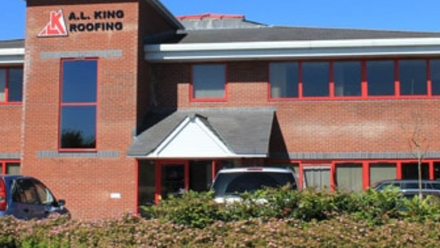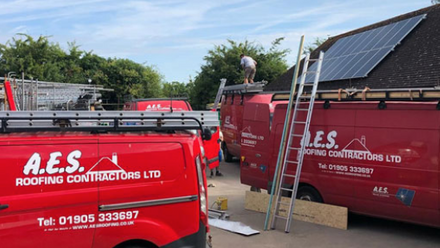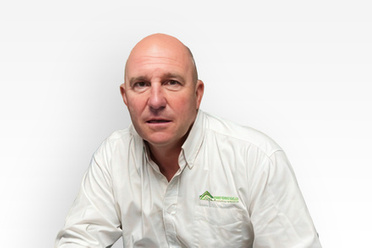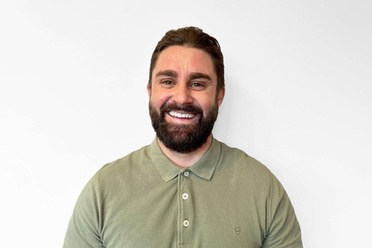Meet the Contractor -George Ashbrook
George, tell me about your business.
It was my parents’ business. They started out as a roofing contractor around 50 years ago. My dad first started it with his nephew, and they worked out of the back of his trusty white van. My mum then started selling new and reclaimed roofing materials, and we expanded into being merchants as well.
While we’re still very much a family business, we have diversified as we’ve grown. Within the group we have a roofing division - where we work on lots of estates and focus on heritage, conservation and specialist roofs. Then we have the merchants, plus two other elements - a small property development company and leasing an industrial estate.
And what’s your role here?
I started working here straight from school, around 16 years ago. I started on the tools as a labourer and I specialised in lead. I even came runner up in the country for the young lead worker of the year award a few years ago. I loved being on the tools, but around the start of Covid my Mum and Dad decided to take a bit of a step back from the businesses, which is when I took over as Managing Director.
You sound busy! Do you have a lot of staff?
We do! We have a small number of roofing contractors (around 10), but we have around 35-40 employees in the group in total. We subcontract some of the work out, only on the new build construction side.
Tell me about your experience of the competent person scheme?
I think we’ve been part of the scheme for around 8 years. We put 60% of our roofing projects through the Competent Person Scheme, which is really helpful. It also really sets us apart from our local competitors, particularly with the insurance-backed guarantee as well. What I like is that when we get inspected by CPS, it is always quite nerve-wracking, but if we make any mistakes, the inspectors will hold us accountable. Even though that can be difficult for a project, it does really help to uphold standards in the industry, so I’m actually really happy that this happens.
And how much benefit do you see from being able to self-certify a lot of your work?
It saves a lot of time, which then saves the business money. It’s the ease of completing a job from start to finish for the end user. We don’t have building control, along with the added cost to the client, coming out to inspect at every stage.
Do you think those homeowners know enough about what they need to be compliant?
No. Some might do, but there is a lot more work that needs to be done. I’ve actually spent some time with both the NFRC and the Competent Person Scheme to discuss what we can do to further educate the public about what they need. From a personal point of view, education would help businesses like us and eradicate those cowboy traders because no one would hire them!
Your website says you’ve been members of NFRC since 1989, is that right?
It is! We have a really old registration number. When we expanded and changed the structure of the group, I had to ask NFRC to let me keep the old registration number, because I knew it would mean the world to my mum. She still knows that number off by heart. Thankfully they said yes.
How do you think being members of the NFRC has helped you?
Immensely. I think NFRC are fantastic for giving guidance and assurance to homeowners. They trust a contractor with an NFRC badge. People are parting with their hard earned money for really important work on their homes, and unfortunately our trade has a reputation for cowboys. NFRC holds us accountable. If you don’t live up to their standards and values, they’ll strike you off.
Tell me more about you. You’ve gone straight from school onto the tools, and now you’re running a business. How did this happen?
I was in a very fortunate position that it was my parents’ business. They worked their entire lives and sacrificed everything along the way to make it work. I’ve had an opportunity to contribute to the business and our family name, which is really important to me.
I’ve tried to educate myself in business, which has been hard, partly because I’m dyslexic. I wasn’t very good at school, and I’m not particularly academic. But I don’t think that means much. The type of person you are is more important. I try to educate myself at every opportunity. I go to networking events, listen to podcasts, audiobooks, attend seminars and make use of the NFRC membership.
To me, business is about people. So long as we’re safe, sustainable and profitable then it’s all good.
You lost some important people during this time, didn’t you?
Yes, unfortunately I lost my uncle in early 2022. He was my dad’s right-hand man. The most senior person in the business and very clever. Sadly then, my Dad quickly became poorly and he died in December 2022. Suddenly I found myself running a business, and the two biggest male role models in my life, both professionally and personally, were no longer there. It was incredibly difficult. Running a business can be very lonely and I miss having them both as a sounding board to help with making decisions. I’m grateful to be able to lean on the NFRC network for guidance when I need it. They’re a fantastic bunch of people.
My mum is still very much a part of the business, and you can find her on the trade counter most days. She has so much knowledge, so she’s always offering advice to customers and generally mothering everyone around her, which she loves. I also have a fantastic senior team around me to help with decision-making.
You must be really proud of yourself, achieving so much through some really horrible circumstances.
I am, yes. I think I forget that sometimes, though. There are always things I’d like to have done more quickly, or done better. I try to keep a really positive mindset though, and even when things have gone wrong, I see it is a learning opportunity.
What part of your job do you love the most?
The relationships we have at work. We are a small family-run business, with a great team. We’re very professional, and great at our jobs, but we also have a good laugh together. Looking at my team and seeing them happy at work brings me lots of joy.
And finally, what does success look like for your business?
I’d like to grow the business a little, but not much. It’s not about making money for me. I do what I do because of my parents, and how much they worked in their lives. I take that on in their name. The family name is incredibly important to me and I want to continue to do it proud.. It’s about everything being as it should be. Safe and sustainable for our team and our customers. That’s what success looks like to me.



